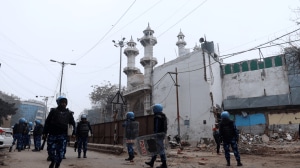Marathi theatre loses iconic doyen
Noted Marathi playwright Vijay Tendulkar 80 passed away on Monday morning. A Padma Bhushan recipient....

Noted Marathi playwright Vijay Tendulkar 80 passed away on Monday morning. A Padma Bhushan recipient, Tendulkar was suffering from myasthenia gravis and was in a critical condition.
8220;His health was critical, but stable till 7 am. After that his respiratory system began to deteriorate and at around 8 am he breathed his last,8221; said Dr Shirish Prayag, who was treating him. He is survived by two daughters 8212; Sushma Tendulkar and Tanuja Mohite 8212; and grandson Aditya.
Tendulkar was cremated at Vaikunth Smashanbhumi at around 10.30 am. Divisional Commissioner Nitin Kareer paid tribute to him on behalf of Chief Minister Vilasrao Deshmukh and Deputy Chief Minister R R Patil.
8220;The Government wanted to honour him during the cremation, but as his family wanted the funeral to be kept simple, we did not interfere,8221; said Kareer.
Tendulkar had expressed the wish that his cremation should be simple, with no rituals and that the media should be kept away from it and no photographs be taken of his body. Tendulkar was not keeping good health for the last four to five months. On April 10, he was brought back to the hospital as his health worsened.
During the last three days he was unconscious and on life support. Tendulkar had his share of tragedies to contend with. He lost his daughter Priya Tendulkar and son Raju a few years back.
His wife Nirmala died three years ago. Tendulkar was a leading contemporary Indian playwright, screen and television writer, literary essayist, political journalist and social commentator.
For the past four decades he had been the most influential dramatist and theatre personality in Marathi with over 35 full-length plays, 40 one-act plays, some plays for children, short stories and two novels. His newspaper columns, Kovali Unhe and Ramprahar, were very popular with readers.
Shantata! court chalu ahe Silence! The Court Is in Session, 1967, Sakharam binder Sakharam the Book-Binder, 1972, Kamala 1981, Kanyadan The Gift of a Daughter, 1983 and Ghashiram Kotwal Ghashiram the Constable, 1972, a musical combining Marathi folk performance styles and contemporary theatrical techniques, are some of his famous plays.
American actors performed English versions of Ghashiram Kotwal and Sakharam binder in the US. Many of his plays were translated into other languages. Besides these, his plays Gidhade, Ashi Pakhare Yeti and Baby were also critically acclaimed.
He also became an iconic screenplay writer in the Hindi film world as he scripted Ardh Satya, Akrosh, Aghat, Manthan, Nishant and Gehrai.
He also left his mark in Marathi films with Samana, Simhasan, Umbartha and Akriet.
Tendulkar was born in Kolhapur and wrote his first story when only six. He went on to write his first play when he was 11 years old. He was a recipient of the Sangeet Natak Academy, Saraswati Samman and Kalidas Samman.
8216;liberated since birth8217;
MOHAN AGASHE: The man was unique and the most unusual quality about him was his ability to be so involved with life and yet be so detached from everything. He had written a beautiful line in one of his plays Ashi Pakhare Yeti which went 8220;Mee janmatana mukta hoto8221;, which means 8220;I was liberated since birth8221;. I think it sums up him and his life quite aptly.
AMOL PALEKAR: Without any doubt, Tendulkar made my life more meaningful and rich by his work8230;With his death, I feel a great era has come to an end. I have been privileged to be a part of his great journey. He passed away with dignity.
PRIME MINISTER MANMOHAN SINGH: His strong espousal of women8217;s empowerment and the empowerment of the downtrodden has shaped public consciousness in post independence India8230; Tendulkar left behind an extremely rich repertoire of highly acclaimed plays, essays and books which would continue to inspire generations of scholars, playwrights and literary personalities in India and abroad.
- 01
- 02
- 03
- 04
- 05































